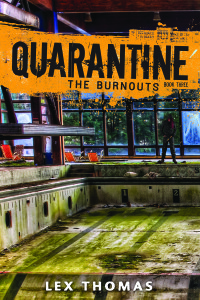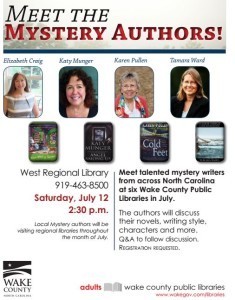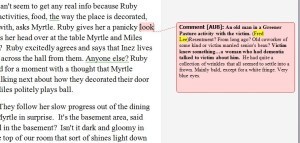Elizabeth Spann Craig's Blog, page 133
July 24, 2014
Resources for Writers—Industry News
By Elizabeth S. Craig, @elizabethscraig
I’ll be the first to admit that reading industry news can be…stressful. I’m one of those people who avoids confrontation at all costs, so I rarely weigh in, although I follow trends and news very closely. I form opinions and those opinions evolve as circumstances evolve.
But it’s vital that we keep abreast of developments. News stories help us make smart decisions with our career paths and contracts. So I thought I’d provide some reputable sources here for news and information. Some of these sites frequently display bias toward self-published/indie authors and some are most-often biased toward traditional publishers. I read them all. I remember studying abroad in London during college and being told I should read The Times, The Independent, and The Guardian to get a balanced view of my own. So I’m following in that tradition.
First off, journalist Porter Anderson’s site. If you don’t have time to follow various sites but want to keep up with industry news…he pulls everything together for you in his reports. He curates news and does a nice job bringing different viewpoints together in each of his posts. Porter writes for different sites, so it’s probably best to follow his site’s RSS feed so you can keep up with him. Or, if you’re on Twitter, just follow him there to receive the most current information—and to also pick up his live feeds from the different conferences he covers.
If you’re looking for breaking industry news, reporter Laura Hazard Owen at Gigaom does a nice job keeping writers current. Her stories can be found here.
Jane Friedman’s weekly feature, “The Smart Set,” is excellent for sharing excerpts of well-written posts on current hot topics and raising questions culled from the content.
Attorney David Vandagriff ‘s Passive Voice Blog serves as an aggregator of industry news and industry discussion. Reading the comments is a must.
Hugh Howey is doing an amazing job speaking on behalf of self-published writers and appears to be on the verge of sparking what Porter Anderson termed a labor movement. He always has something interesting and thoughtful to say.
Joe Konrath’s posts can get heated, but his thoughts on problems inherent with traditional publishing frequently fascinate me.
David Gaughran’s blog reports on industry upheaval but also helps writers wade through tough issues and helps provide guidance on areas writers might be debating (should we go on Wattpad? Should we try KDP? What does the breaking news from Amazon mean for me?). He’s also done some nice reporting on publishing scams.
Digital Book World reports industry news and holds a yearly conference for publishers and other content providers on adapting to the digital landscape.
Mike Shatzkin’s blog, The Shatzkin Files, offers in-depth analysis of publishing-related issues from an industry perspective. (Mike Shatzkin has spent nearly fifty years in the business in many different roles.)
So…if you want to keep up with industry news, there are plenty of options. What are some of your favorite sites? Read any of these?
Image: MorgueFile: Alvimann
The post Resources for Writers—Industry News appeared first on Elizabeth Spann Craig.
July 20, 2014
Integrating Writing Into Life
by Lex Thomas, @LexThomasAuthor
We all have our demons. Mine is writing. It’s been with me since I was little, this  compulsion to create. A nagging feeling like I shouldn’t be living in this moment, I should be recording it. When life is calling, when reality is demanding my attention, that urge to write it down can be a horrible feeling. I feel as though I’m being pulled in two, because an idea requires so much thought and time and energy to become realized. As much as I feel a responsibility to my waking life, to my loved ones, to the care of my home and body, to my simple day to day enjoyment, I also feel a responsibility to this story I’ve conjured in your head. And by no means is exorcising it an easy process. Writing takes time. It’s not instantaneous. It’s a process. A story becomes worth reading in stages, each one as lengthy as the one before it.
compulsion to create. A nagging feeling like I shouldn’t be living in this moment, I should be recording it. When life is calling, when reality is demanding my attention, that urge to write it down can be a horrible feeling. I feel as though I’m being pulled in two, because an idea requires so much thought and time and energy to become realized. As much as I feel a responsibility to my waking life, to my loved ones, to the care of my home and body, to my simple day to day enjoyment, I also feel a responsibility to this story I’ve conjured in your head. And by no means is exorcising it an easy process. Writing takes time. It’s not instantaneous. It’s a process. A story becomes worth reading in stages, each one as lengthy as the one before it.
So the question becomes: how do I manage this responsibility of writing when it doesn’t feel like it fits neatly into the rest of my life? Figuring out how to manage writing has been as much of a journey as the craft of it. There are those impossible maniacs who seem to be able to write anywhere, anytime, picking up and putting down their narrative at the drop of a hat, writing on napkins, in their phones, on walls. I’ve never been that way. I’ll do that when I’m brainstorming, but as far as the actual composing of words goes, the drafting, I’m the worst kind of writer. I lost most of ability to hand-write around 2002. Now, I can’t write without a computer. It also takes me a good 45 minutes to get in the zone and another 45 minutes to get out of that creative headspace and become sane again. I can’t write at night. I’m just not wired that way. My best hours are old-fashioned: 9 to 5. You know, those hours when most employers expect you to work.
I’ve been in every type of working scenario, and let me tell you the best one is no straight job at all. I’ve never been so functional and prolific as a writer as when I could keep that 9 to 5 schedule, 5 to 6 days a week, but that’s a luxury, rather than the norm. The world is expensive, and writing rarely pays. When you’re under contract and the check’s in the bank, you write like the wind. Because you know that it’s only a matter of time before the world comes knocking. But what happens when you’re writing on spec, and the bills need paying, your children need their dad, and your wife needs her husband? You have to be there for them.
So, after all my yammering and qualifying, what am I saying? Schedules change. And fighting your life, feeling torn in two directions, fueling a building frustration that life is standing in the way of your writing doesn’t help your life or your writing. It makes you sour. The key is to find balance. Openness, seeing your life and your writing as symbiotic will help you find a more natural process. When life is hectic, and I find myself needing to write for hire, I’ve had to adapt. My word processor of choice is Scrivener, now more than ever, because of the Project Targets feature. It allows me to create my own deadline and figures out the word count I need to hit with every session to stay on target. If your time is limited, knowing that you only need to knock out 700 words helps you buckle down when you think, “oh god, I couldn’t possibly write right now.” When I’m not near my computer, I can use Google Drive on my phone, and access a live document. It helps me feel like my writing isn’t a compartmentalized experience. It’s not ideal, but it keeps me moving forward.
All that said, when you find those moments when the world doesn’t need you, steal them.
Lex Thomas is the pen name used by the screenwriting team of Lex Hrabe and Thomas Voorhies.
and Thomas Voorhies.
Lex Hrabe was a Drama Geek in high school as well as student body president. L
ex received a BA in Drama and English from the University of Virginia and has worn hats as an actor, director, and writer. In addition to working as a screenwriter, he heads development at Cinespire Entertainment, a boutique production company.
If Thomas Voorhies were a character in the Quarantine trilogy, he would be a member of the Art Geek gang. Thomas graduated with a BFA from the Rhode Island School of Design and continues to practice and exhibit his realist oil paintings. To see a selection of his artwork, visitwww.thomasvoorhies.com.
Lex Hrabe lives in Virginia; Tom Voorhies lives in California.
The post Integrating Writing Into Life appeared first on Elizabeth Spann Craig.
July 19, 2014
Twitterific Writing Links
by Elizabeth S. Craig, @elizabethscraig
Twitterific links are fed into the Writer’s Knowledge Base search engine (developed by writer and software engineer Mike Fleming) which has over 23,000 free articles on writing related topics. It’s the search engine for writers.
Create a Compelling Character, Addendum: His or Her Unique Perspective: http://ow.ly/z9jTA @CockeyedCaravan
Authors Will Soon Be Able to Sell their eBooks on Facebook: http://ow.ly/zkGvj @Goodereader
Where To Set Your Story and Tips for Researching Locations: http://ow.ly/zlTFh @LovelyAuthor
How can we ease the summer’s debate? http://ow.ly/zkRCm @Porter_Anderson @HughHowey @philipdsjones
How to Start Your Story: http://ow.ly/zc9vQ @HGComan
3 Steps to Taking Your Character Further and Deeper With Anger: http://ow.ly/zc9yr @angelaackerman
Should you revise, rework or reject your book? http://ow.ly/ @emma_darwin
12 Hashtags for Promoting Your Book: http://ow.ly/zca8k @ReadersJournal
4 Ways To Write Every Day: http://ow.ly/zcadP @woodwardkaren
Choosing and Staying True to A Point of View: http://ow.ly/zcbhZ @amyjmcelroy
Creating a Scene Outline for Your Novel: http://ow.ly/zcbVu @JodieRennerEd
Always Open To The Possibility Of Writing: http://ow.ly/zcah8 @jrobertlennon
100 Writing Prompts: http://ow.ly/zcapg @Wiseink
Pricing Strategies for Ebooks in a Series: http://ow.ly/zcbOz @goblinwriter
Why children’s literary heroes need to be less white: http://ow.ly/zcaTe @amymcculloch
26 Ways Writers Can Make a Workshop Successful: http://ow.ly/zcbdS @themjkelley
Write an irresistible book blurb in 5 easy steps: http://ow.ly/zcavb @writers_write
In Defence of Ghostwriting: http://ow.ly/zcb5B @GMcDuling
How Authors Can (and Should) Use Author Copies: http://ow.ly/zc9br @outskirtspress
20 Ideas for Sharing on Social Media: http://ow.ly/zgfuO @CaballoFrances
11 Author Quotations to Help Reluctant Readers Find Their Way: http://ow.ly/zgeAH @geekerydo
Friendships Among Your Characters: http://ow.ly/zgfqp @CantrellJason
You’re not behind and writers are not in a race: http://ow.ly/zgeJc @deanwesleysmith
Successful Querying: ItÂ’s Not All About The Letter: http://ow.ly/zgfSD @mmfinck @womenwriters
When Real Life Happens To Your Fiction: http://ow.ly/zgeZ5 @chgriffinauthor
Freelancing: Make a Living as a Writer: A Simple Strategy That Works: http://ow.ly/zgemq @hopeclark
9 Things Writers Need to Know Before the Book Deal: http://ow.ly/zkO8C @MartinaABoone
The Arc of The Indie Author Journey: From First Book to CEO Of Your Global Media Empire: http://ow.ly/z9icl @thecreativepenn
July 2014 Author Earnings Report: http://ow.ly/zkGEI @AuthorEarnings @HughHowey
How to Write a Negative Character Arc: The First Act: http://ow.ly/z9jc4 @KMWeiland
Do Writers Practice Their Art? http://ow.ly/z9j84 @janice_hardy
History’s Most Heinous Typos: http://ow.ly/z9juZ @drummondmoir
How to Live the Brave Story You Must Write: http://ow.ly/z9izU @JeffreyDavis108
3 Ways to Brand Your Covers: http://ow.ly/z9iTG @janetkgrant
What to blog about: 5 top tips for new and aspiring authors: http://ow.ly/z9iY2 @altait
Never let research get in the way of a good story: http://ow.ly/z9ijN @IrishTimes
7 Questions that Will Change How You Publish: http://ow.ly/z9iPD @cjlyonswriter
Situations in crime fiction when characters are faced with difficult choices: http://ow.ly/zja2R @mkinberg
7 Things Writers Can Learn from Stand-up Comedians: http://ow.ly/z9jhE @byagoda
How To Begin Your Book With A Knockout: http://ow.ly/z9j23 @huffpost
Enjoy what you’re writing or you’ll never finish: http://ow.ly/z9iox @Eliz_Mallory
One Thing Authors Shouldn’t Leave Out of A Story’s “Big Moment”: http://ow.ly/z9j5R @vgrefer
Even Harvard Business School advice may not work for publishers in their struggle with Amazon: http://ow.ly/zgrBH @MikeShatzkin
How To Change the Future of Publishing Now, Even Though It’s Too Late: http://ow.ly/zgvkn @vaporbook
5 Things Every Screenwriter Should Know About Writing A Novel: http://ow.ly/z6F9G @Abdaddy
Stereotypes, Tropes, and Archetypes: http://ow.ly/z6ET1 from Clever Girl Helps
A Crash Course in Mystery Sub-Genres: http://ow.ly/z6ENF @MarcyKennedy
A digital renaissance for the science fiction short story: http://ow.ly/z6EY3 @damiengwalter
Preparing for Success (and finding more time to write): http://ow.ly/ @DanBlank
5 Signs Your Character Is Fully Developed: http://ow.ly/z6GbN @mythcreants
Mystery Novelist Daniel Friedman on Amazon v. Hachette: http://ow.ly/zgDvv @junglereds @DanFriedman81
Songwriting Tip: Rhyming http://ow.ly/z6EM9 @harrietschock
Uses of the Past Participle: http://ow.ly/z6ES4 @writing_tips
Character Checklist: http://ow.ly/zgBQF @MartinaABoone
Putting An End To Plot Conveniences: http://ow.ly/z6F5b @litreactor
Why characters are the heart of your novel – & how you can write them effectively: http://ow.ly/z6FgI @roz_morris
How to Get Successfully Published Today: Big 5, Indy, or Self-Publish? http://ow.ly/z6F6S @passivevoiceblg
Submit Queries Using Real Name or Pen Name? http://ow.ly/z6FWG
$5k advances for lifetime rights of works that can’t go out of print is indefensible: http://ow.ly/zguS2 @HughHowey
What Is the Future of the Physical Bookstore? [Smart Set] http://ow.ly/zgrwe @Janefriedman
Writer Nightmares: http://ow.ly/z6FfR @rebeccamakkai
Sentence clauses and commas. http://ow.ly/z6EUN @ericjbaker1
5 Free Tools of Social Media Success for Writers: http://ow.ly/z6G95 @SMisDynamite
How to fix a plot hole: http://ow.ly/z6Fc8 @roz_morris
How character POV affects word choice: http://ow.ly/z4W6h @weifarer
3 Quotes every Writer should Ink to their Souls: http://ow.ly/z4VWH @EudaimoniaJanne
If Writers Wrote as Some People Talk: http://ow.ly/z4WmJ @Massim0Marin0
Common Plotting Faults and What to do About Them: http://ow.ly/z4Uq4 @barbbradley
6 Things That Will Happen a Few Days Before Your Book Comes Out: http://ow.ly/z4VdK @Petermball
Handling eBook Pirates http://ow.ly/z4VTN @BadRedheadMedia @macpetreshock
For Writers, Are Bars the New Coffee Shop? http://ow.ly/z4Ws0 @UrbanMuseWriter @contently
Here’s why you shouldn’t underestimate the power of setting: http://ow.ly/z4WLD @standoutbooks
Take Your Characters Out to Lunch: 5 Development Exercises: http://ow.ly/z4VPe @adearinthewoods
8 Reasons All Authors Need Business Plans for Their Books: http://ow.ly/z4VIX @ninaamir
How to Personalize Your Revision Checklist: http://ow.ly/z4Wjj @writing_tips
Finding an Agent: What No One Wants to Talk About: http://ow.ly/z4V2p @arnabontemps
Battling Cliches & Tired, Old Tropes: Hate-at-First-Sight Love Stories: http://ow.ly/z4Xda @stdennard
Harper Lee gave the US a story for the ages. Just don’t ask her about it: http://ow.ly/z4W8J @CharlesLeerhsen @SmithsonianMag
How To Maintain Your Writing Voice: http://ow.ly/z4Vn8 @SITSGirls
What does #Steampunk Mean? 10 Authors Share their Vision of the Genre: http://ow.ly/z4WE3 @Fuelforwriters
6 Things Your Book Publicist Won’t Tell You: http://ow.ly/z3RJ2 @SarahPinneo
Writing with Emotion: http://ow.ly/z3Oxa @JanalynVoigt
Having Trouble Plotting Forward? Try Plotting Backward: http://ow.ly/z3Phq @Janice_Hardy
How NOT to write disabled people: http://ow.ly/z3OV7 @disabilityinlit
The Daily Routines Of 26 Of History’s Most Creative Minds: http://ow.ly/z3JPv @FastCoDesign
Standalone or series? http://ow.ly/z3RTk @Author_DFarland
An agent on agent guidelines and querying: http://ow.ly/z3KqS @Janet_Reid
Script To Screen: “Cinema Paradiso”: http://ow.ly/z3RQV @gointothestory
#FutureChat recap: How can we pay authors what they deserve? http://ow.ly/zbu56 @Porter_Anderson @MirabilisDave @camillelaguire
What Should an Author Expect from an Agent? http://ow.ly/z3JHC @susanspann
5 Top Tips To Boost Writing Productivity | Self-Publishing Advice http://ow.ly/z3JBf @CSheehanMiles
On Writing the First Kiss: http://ow.ly/z3KHi @AnnaCampbelloz
What Is Voice In Fiction? http://ow.ly/z3KAR @MartinaABoone
Query question: how much less enticing is a second novel? http://ow.ly/z3OE4 @Janet_Reid
So You Want To Make A Living Writing? 13 Great Truths: http://ow.ly/z3L1g @bob_mayer
20 Ways To Reuse, Recycle and Repurpose Content: http://ow.ly/z3JsP @bookgal
10 things most writers don’t know about the woods: http://ow.ly/z3Rqm @DanKoboldt
What 1 writer learned while reading for an agent: http://ow.ly/z0qf9 @OrlyKonigLopez
Continue writing a successful series? Or take time out for something new? http://ow.ly/z8DWP
5 Essential Questions to Ask When Writing Your Protagonist: http://ow.ly/z0oet @bridgetmcnulty
How to Respond to Alarming Industry Changes: http://ow.ly/z0ozO @rachellegardner
4 Reasons We Sometimes Write (Too) Slowly: http://ow.ly/z0pKP @vgrefer
Will Publishing Change The Tone as Rhetoric on Both Sides Heats Up? http://ow.ly/z9cIZ @thoughtcatalog @Porter_Anderson
Why We Need ‘Ugly’ Heroines: http://ow.ly/z0p3t @buzzfeed
Dinner parties featured in crime fiction: http://ow.ly/z8u5k @mkinberg
The Author-Reader Amazon Revolution:Mirage or Reality? http://ow.ly/z0opa @claudenougat
10 Tips to Beat Writer’s Block: http://ow.ly/z0pk0 @sdwriter
6 Writing Tips From John Steinbeck: http://ow.ly/z0o65 @verbicide
The 8 laws of Foreshadowing: http://ow.ly/z0ppn @nownovel
9 Great Tools and Programs to Help You Edit: http://ow.ly/z8oyF @alexjcavanaugh
The Art of the Opening Sentence: http://ow.ly/z0nPq @jrc2666
Recharge Your Writing Batteries: http://ow.ly/yX1It @CarolineLawrenc
When a Writing Dead End Becomes a Detour to Success: http://ow.ly/yWUA6 @NinaBadzin
Magical Creatures for Magical Worlds: Fairies http://ow.ly/yWUvo @Chilari
Point of view shifts and head-hopping: always bad? http://ow.ly/yWUqT @roz_morris
Hidden Emotions: How To Tell Readers What Characters Don’t Want To Show: http://ow.ly/z0p7O @angelaackerman
What Defines Traditional Publishing? What You Don’t Know CAN Hurt You. http://ow.ly/z6HxJ @annerallen
The 7 Paragraph Synopsis: http://ow.ly/yWTfw @HopeRamsay
3 Ways to Plan a Marketable Novel without Losing Creativity: http://ow.ly/yWSHK @ninaamir
Dissecting Your Characters: http://ow.ly/yWRqg @TerriLAustin
Positive Versus Negative Description: http://ow.ly/yWTpV @Kid_Lit
3 Ways to Train Your Brain to be More Creative http://ow.ly/yWSVP @AlexZamorski @thewritelife
A normal life for our characters? http://ow.ly/yWRv0 @VickyThinks
Writing Workshops: Tough Love, Indulgence, or Shark Tanks? http://ow.ly/yWRA8 @BTMargins
Why Words Matter in Fiction and Story: http://ow.ly/yWUol @noveleditor
How to Create a Compelling Character: The Moment of Humanity http://ow.ly/z9jGa @CockeyedCaravan
The post Twitterific Writing Links appeared first on Elizabeth Spann Craig.
July 17, 2014
Resources for Writers: Protecting Ourselves
By Elizabeth S. Craig, @elizabethscraig
Unfortunately, protecting ourselves against scams is a very important topic for writers. And I think that, sadly, we’re easy prey since we’re eager to publish and want so much for our story.
Today, I’m sharing resources that help us avoid bad contracts, publishing scams, shady agents, etc.
First of all, Preditors and Editors (the unusual spelling is intended). This site maintains lists of recommended (or “not recommended”) agents, publishers, contests and more. If you worry you’re potentially being scammed or wonder if the agent you’re considering is reputable, this should be your first stop.
Writer Beware is another important resource that updates writers on current scams that writer Victoria Strauss has uncovered. The blog’s mission statement: “Shining a bright light into the dark corners of the shadow-world of literary scams, schemes, and pitfalls. Also providing advice for writers, industry news and commentary, and a special focus on the weird and wacky things that happen at the fringes of the publishing world.”
If you are in the position of having to negotiate your own contract, there are resources available to help you know what to be on the lookout for. I wrote a post in 2010 that covered as many available resources as I was able to find at the time. Most helpful, I think, was the Agenting 101 series of posts, put together by agent Kristin Nelson, now Hugh Howey’s agent. Part one of the series is here and you can find the rest of the series in her right sidebar. I used this series to negotiate my first contract with Midnight Ink before I was agented.
Because these posts are a bit dated, I also want to share the link to Passive Voice Blog where lawyer David Vandagriff will caution you about non-compete clauses (which have no business in our contracts).
Keeping it Legal is a blog by self-published writer and lawyer Helen Sedwick . She has helpful posts on a variety of legal topics for writers, including “10 Legal Terms Every Writer Should Know.”
Susan Spann’s blog: Susan Spann (no relation to me) is also a lawyer and writer and frequently posts on contracts and other legal issues concerning lawyers. Her publishing law posts are particularly helpful.
Protecting ourselves may also mean protecting ourselves from lawsuits. Industry expert Jane Friedman has two important posts that I think every author should read: “When Do You Need to Secure Permissions?” and (this one a guest post by attorney Bradlee Frazer) “Is It Fair Use? 7 Questions to Ask Before Using Copyrighted Material.” I’ve read these posts numerous times.
Also on Jane Friedman’s site is a helpful post from lawyer Helen Sedwick, this time on the topic of taxes: “What Every Self-Published Author Needs to Know About Taxes.” This article covers protecting ourselves from a nasty surprise around tax time (and I’ve had them before, unfortunately).
These are my go-to sites for educating myself on various problems I could face as an author. Do you have any sites to add or info to offer?
Image: MorgueFile: Alvimann
The post Resources for Writers: Protecting Ourselves appeared first on Elizabeth Spann Craig.
July 13, 2014
Weighing Writing Choices
By Elizabeth S. Craig, @elizabethscraig
I’ve always been very jealous of writers who have spectacular, manuscript-worthy dreams. Those writers who wake up with ideas for their works in progress or for new stories, falling out of their beds to find a pen and paper.
Although I often get story ideas in those drowsy moments right before I fall asleep, my dreams have always been a source of consternation for me. They’re pedestrian visions of forgotten locker codes from decades ago, anxious and imaginary wanderings through unfamiliar cities with no map to guide me. They’re even work-related dreams of me writing…without, mind you, the actual writing which would make such dreams worthwhile. My dreams are basically me worrying over minutiae.
Which is why my dream last week was so completely extraordinary.
I woke up, gasping, sitting straight up in bed, scaring my husband half to death. I could still see the freight train from the dream, so real I could practically feel the breeze as it went by.
And I had a whole skeleton of a book…from the dream.
Naturally, after years of complaining about my boring dreams, I wasn’t about to squander this opportunity. I gave up on sleeping (yes, it was…oh, maybe two-thirty in the morning) and created a rough outline for the story along with character sheets.
Then I looked at the outline. Well, what the heck was I supposed to do with that? It wasn’t that it was a bad story. But it presented me with a bunch of problems.
Problem #1: It was a story that wanted to be lit fic. Even though the characters were teens. It didn’t want to be YA.
Problem #2: It was a story that wanted to be a standalone.
Problem #3: Neither of those things (lit fic, standalones) sells particularly well.
Problem #4: My brand as an author isn’t associated with lit fic at all. This means I’d likely want to write this book under another name. Which involves a web presence of some kind for that other name. Which involves time.
Problem #5: I’m writing a series that’s doing well. I have dedicated readers for it. It makes no sense to spend three months writing a project that won’t sell in a genre I don’t write for readers that don’t exist.
Of course, the argument against giving in to the problems with the story is that I would likely enjoy writing the story. I’d find it creatively stimulating. It would be a challenge.
But…it’s also a challenge for me to write my own, fairly successful series. In fact, the challenge grows with every book, with every new reader. The challenge is to create new and exciting material within the story world and with the recurring story characters. The challenge is creating character growth to prevent popular characters from getting too static…without changing the characters so much that readers are unhappy with the changes. There are plenty of creative challenges there and will be for a long time.
So, even though it was a Shiny New Idea (and we all know how tempting those Shiny New Ideas are, especially when we’re slogging through other stories…I’m writing one and editing another currently), I’m going to shelve it for a little while. My thoughts are that build up a couple more releases for my self published Myrtle Clover series, finish out my responsibilities for my trad published series, and then I’ll write the book. Because clearly—the book has to be written.
It made me think of all the writers who are facing similar questions: should I write this new story? When? Should I write the story under my name, if it’s a different genre than I usually write? And for writers who might be increasingly dependent on the income they’re now making from the more commercial genres (mystery, romance, YA), should they take a break from a lucrative gig to branch out into a less-popular area…like literary fiction? When might they reach the point where they feel they can take on something completely different?
Have you faced these questions as a writer? How did you choose your course?
Image: MorgueFile: can131
The post Weighing Writing Choices appeared first on Elizabeth Spann Craig.
July 12, 2014
Twitterific Writing Links
by Elizabeth S. Craig, @elizabethscraig
Twitterific links are fed into the Writer’s Knowledge Base search engine (developed by writer and software engineer Mike Fleming) which has over 23,000 free articles on writing related topics. It’s the search engine for writers.
Writing a Great Proposal in 8 (Not Particularly) Easy Steps: http://ow.ly/yO2yT @literaryeric
Writing Under The Influence of Music: http://ow.ly/yO2uI @mcmuhlenkamp
The Backstory Battle: http://ow.ly/yO2Zg @AnthonyEhlers
Character Change: http://ow.ly/yO31c @HeatherJacksonW
7 Ways to Tighten Your Prose: http://ow.ly/z3Scx @DanKoboldt
The Latest Trends in the Indie Author Market [Smart Set]: http://ow.ly/z3SiQ @JaneFriedman
If Strangers Talked to Everybody like They Talk to Writers: http://ow.ly/yPXxF @ElectricLit @TheLincoln
Protecting your literary estate: http://ow.ly/yPXNG @junglereds
How many characters are too many? http://ow.ly/yPXjj @gaelynnwoods
Negative, Continuous, and Passive Forms of Subjunctive Mood: http://ow.ly/yPXMi @CSLakin
The Building of a Setting: http://ow.ly/yPXKt @biljanalikic
39 Things to Remember While Struggling to Build Your Writing Career: http://ow.ly/yPXFX @writerplatform
Presence on the Page: What It Is, and What It Isn’t: http://ow.ly/yPXsj @manzanitafire
Occupational Hazards for Writers: http://ow.ly/yPXIP @Kathy_Crowley
Describing the physical attributes of your characters: http://ow.ly/yO1zz From Clever Girl Helps
How to Write Fat Books: http://ow.ly/yO23d @brainpicker
5 Ways to Put More GO Into Your Goal Setting: http://ow.ly/z3tOP @Jenpens2 Write_Tomorrow
3 Twitter Basics You Probably Don’t Know About: http://ow.ly/yO26e @loriculwell @BadRedheadMedia
The New Top-Down Approach: http://ow.ly/yO2wd @hughhowey
Tips for Pulling Off a Reading: http://ow.ly/z3IVC
How Scrivener Helped 1 Writer Organize All His Writing: http://ow.ly/yO2kH @kingthor
Writers Conferences – Worth the Expense? http://ow.ly/yO2tu @novelrocket
How to Spot a Scam | Indies Unlimited http://ow.ly/yO34V
How To Think Like Your Agent – That Book Sold HOW MANY Copies? http://ow.ly/yO1PU @literaryeric
A look at how crime fiction writers depict characters dealing with loss: http://ow.ly/z2KmC @mkinberg
Can an Author Co-Op Work For You? http://ow.ly/yO28G @Wiseink
Elizabeth Gilbert on writing: http://ow.ly/yO2NW @GilbertLiz @galleycat
11-Step Guide to Writing a Scene from Screenwriter @johnaugust: http://ow.ly/yO2V7 @nofilmschool
Write a Sizzling Modern Adaptation of a Classic Story: http://ow.ly/yO1xp @epbure
A Writer’s Working Vacation: http://ow.ly/yMmZh @cathychall
Start With a Change, Not Just Action: http://ow.ly/yMmVZ @jodimeadows
The Highs and Lows of Writing : http://ow.ly/yMnzD @CarolineSandon @womenwriters
Estimating Kindle Sales From Amazon Rankings: http://ow.ly/yMnt1 @Brandilyn
10 Tips to Promote a Book When the Author is MIA…or Dead: http://ow.ly/yMnlH @Rachelrooo @pubperspectives
Why Is Romance Reviled? http://ow.ly/z14q2 @Porter_Anderson @thoughtcatalog @barbaraoneal
What Are Your Secondary Characters Good At? http://ow.ly/yMn3v @Janice_Hardy
The Four Primary Pillars of Novel Construction: http://ow.ly/yMnBh @CSLakin
POV Shifts: http://ow.ly/yMnc2 @Ross_B_Lampert
Media Bias Against Self-Publishing: http://ow.ly/z0OPA @HughHowey
Online Marketing Mistakes: http://ow.ly/yMnp7 @storyrally
Overcoming the Sense of Failure as a Writer: http://ow.ly/yMn6j @LyndaRYoung
9 Self-Publishing Fiction Writers to Follow Today: http://ow.ly/z0lAs @storyrally @JFBookman
Authors’ incomes collapse to ‘abject’ levels (for trad. pub): http://ow.ly/z0lfw @alisonflood @guardianbooks
Why you should prioritize your author website over social media: http://ow.ly/yMnWD @chrisrobley @Bookbaby
Dash Your Way Out of Procrastination: http://ow.ly/yMo2V @99u
Good-bye Confusing Subplot, Hello Book Contract: http://ow.ly/yMnJ9 @Margo_L_Dill
How to Write a Great Book Proposal: http://ow.ly/yIwHZ @lindasclare
How to Fit Writing Into Your Life: 6 Tips: http://ow.ly/yIwCE @Natasha_Lester
Ed McBain: 7 Ways To Write A Crime Story: http://ow.ly/yIvUp @woodwardkaren
Navigating a New Season in Your Writing Life: http://ow.ly/yIvwN @JuliaReffner
Writing yourself a pen name: http://ow.ly/yIwmS @guardianbooks
Head-hopping, explained: http://ow.ly/yIvQz @Wordstrumpet
Know Your Novel’s Characters: 3 Easy Strategies: http://ow.ly/yIwTT @lindasclare
5 Factors For A Great Book Cover: http://ow.ly/yIvbt @selfpubreview
Character Habits: http://ow.ly/yIv7d @noveleditor
Why We Write: Giving Voice to the Ineffable: http://ow.ly/yIvjZ @BTMargins @kimtriedman
How to Tell if Your Protagonist Needs a Better Goal: http://ow.ly/yIvGG @kmweiland
Cliffhangers: How to Keep Your Reader Reading: http://ow.ly/yIww0 @Wiseink
Playwriting vs Novel writing: http://ow.ly/yIw6a @Ctmannino
How to Use Layers to Show Intense Emotions: http://ow.ly/yIvE5 @jamigold
12 Essential Steps from Story Idea to Publish-Ready Novel: http://ow.ly/yIvot @JodieRennerEd
Consistency Checker: A Free Proofreading Tool: http://ow.ly/yIv1b @CKmacleodwriter
“But”, “therefore”, “and so”’ keep conflict in your plot http://ow.ly/yIwcJ @nownovel
Plotter or Pantser: —Who Says You Have to Choose? http://ow.ly/yIvKe @LitCentralOC
UK author income survey: Another publishing bombshell: http://ow.ly/yW06m @Porter_Anderson @TheFutureBook
“Is it my query or my sample pages?” Why you’re not getting full manuscript requests: http://ow.ly/yFsIh @carlywatters
14 Tips to Surviving Your Book Signing: http://ow.ly/yFsFa @StinaLL
Adventures in Author Readings: http://ow.ly/yFsB9 @DeborahJRoss
How to speak publisher: F is for Feedback: http://ow.ly/yFxku @annerooney
When Authors Turn On Authors: http://ow.ly/yVv2X @ChuckWendig @JAKonrath @Porter_Anderson
Showing, Not Telling, in an Opening Scene: http://ow.ly/yFxu3 @janice_hardy
The Escalation of Complications: http://ow.ly/yFt7Y @mooderino
Act out to create vivid scenes: http://ow.ly/yFt0H @onewildword
5 Brilliant Business Lessons From Motley Crue: http://ow.ly/yFxDd @joshrottenberg @FastCompany
Strengthening Your Character Through Personal Relationships: http://ow.ly/yFx1w @enderawiggin
Lessons From @jamesscottbell : Characters That Jump Off The Page: http://ow.ly/yFsy0 @angelaackerman
Discomfort vs. Discomfiture: http://ow.ly/yFx73 @writing_tips
Avoiding Common Punctuation Errors: http://ow.ly/yFsao
Don’t Use Five-Dollar Words: http://ow.ly/yFt3v @Jen_328
The Danger of Political Correctness for Diverse Books: http://ow.ly/yFsjk @jamigold
Secrets to a Good Logline: http://ow.ly/yFsMX @Kid_Lit
Your Novelty Picture Book: http://ow.ly/yFtcZ
Recap of online #FutureChat debate–dueling open letters: http://ow.ly/yVrMK @Porter_Anderson
7 Questions to Ask Before Choosing a Self-Publishing Company: http://ow.ly/yCRXS @HelenSedwick
A New York Editor and Author Goes Indie: http://ow.ly/yCSny
How Soon Do We Need to Show Genre in Our Novels? http://ow.ly/yCQOY @janice_hardy
6 Things to Consider When Writing Promotional Copy for Your Book: http://ow.ly/yCUHy
5 Creativity Lessons from Hall of Fame Inventors: http://ow.ly/yRTTi @PatrickRwrites
Write Nonfiction: How to Become an Instant Expert: http://ow.ly/yCR0w @angee
10 Tips to Make Your Cozy Mystery Sell: http://ow.ly/yCVjJ @NancyJCohen
Advertising for Indie Authors : http://ow.ly/yCXOi @SeeleyJamesAuth
The State of Self-Publishing: http://ow.ly/yCVhG @HughHowey
Which courses should I take to become a writer? http://ow.ly/yCUFm @roz_morris
How 1 Writer Got Published in the New York Times On Her First Try: http://ow.ly/yCUzQ @GillespieKarin
4 Tips for Setting Up Your International Amazon Author Central Pages: http://ow.ly/yCV1x @MarcyKennedy
Story Structure: the Second Plot Point: http://ow.ly/yCV9z @inkybites
How Your Blog Helps Your Books Take Off: http://ow.ly/yCRfG @111publishing
5 Surprising Ways Regret Can Deepen Your Hero’s Arc: http://ow.ly/yCUV9 @writingeekery
Jim Butcher On How To Write A Suspenseful Story Climax: http://ow.ly/yCQRc @woodwardkaren
Query Letters: How to Get an Agent to Beg to Read More: http://ow.ly/yCUPO @WriterlyTweets @SDWriters
Self-Publishing a Second Time: http://ow.ly/yziZc @kristenelisephd @lcharnes
8 Essentials Tips for a Successful Book Reading by a Self-Published Author: http://ow.ly/yzj1W @judy_croome
Finding the Editor Who’s Right for You: http://ow.ly/yzhXR @WritingRefinery
Assessing your writing goals at mid-year and not where you want to be? Camp NaNoWriMo is 1 option: http://ow.ly/yPXat @NaNoWriMo
25 more ideas for daily blog posts http://ow.ly/yzibN @michellerafter
Effort alone isn’t enough: http://ow.ly/yzi74 from David Cain
Why shortcuts short circuit writing: http://ow.ly/yzj5z @stephenwoodfin
Another Look at the Subjunctive Mood: http://ow.ly/yzjyH @CSLakin
1 Writer’s Journey to Becoming an Optimist: http://ow.ly/yzhVm @PaulaAltenburg
The post Twitterific Writing Links appeared first on Elizabeth Spann Craig.
July 10, 2014
Tips for Pulling Off a Reading
By Elizabeth S. Craig, @elizabethscraig![elizabeth (2)_thumb[21]](https://i.gr-assets.com/images/S/compressed.photo.goodreads.com/hostedimages/1405073158i/10336054.jpg)
First off, I have an increasingly rare public appearance to announce. Saturday—tomorrow, actually—I’m going to be on a panel of mystery writers at 2:30 p.m. at the West Regional Library in Cary, North Carolina. It’s my understanding that we’ll be discussing mystery subgenres, how living in this (Southern US) region has affected our writing, and industry changes and the rise of self-publishing.
In addition, there’s a reading. :) Those who have read my blog for a while know that I’m not fond of giving readings. The last one I gave is pictured above…I was at a 2011 event with Avery Aames, pen name for Daryl Wood Gerber (I was appearing as Riley Adams). And–Daryl is a former actress who has co-starred on such shows as “Murder, She Wrote.” So…yeah. I didn’t sound so hot compared to Daryl. At least I’m on a panel, so I won’t be the only one. And, even more fortunately, I’ve recently reacquainted myself with a helpful post on successful readings. It was a guest post writer Jennifer Nielson wrote for Shrinking Violet Promotions several years ago, entitled “The Rules of Readings.”
One of the (many) reasons readings frustrate me is because it’s challenging for me to pick an appropriate passage to read. This time I decided to use the teaser info that Penguin had selected to stick in the previous book. But still—I don’t know, it just seemed like an awkward spot to begin reading.
But Jen Nielson gave two excellent tips in her post. One was to edit the passage. Yes, even though it’s been published:
…prepare for some surgery on the excerpt. Eliminate anything that doesn’t add to your reading, even if it’s an important thread to the overall plot. This includes long descriptions (of anything), and backstory references irrelevant to this excerpt. They’d feel like moving through mud while you’re reading. It also will include dialogue that may make sense within the total context of the story, but that is extraneous within the small passage you’ll be reading.
I think that if I hadn’t gotten permission to do this from another author I’d have convicted myself of heresy for suggesting this. But doesn’t it make so much sense? While heavy description and exposition may work in the context of a 275 page novel, it makes so much mess to slog through during a reading. I’ll keep the changes minor, instead of making drastic changes. If I needed to make drastic changes, I’d choose a different passage or a different book.
In the same vein, Nielson recommended some character “surgery”, too. For example, the passage I was considering using was used to introduce the reader to some of the future suspects and give readers a sense of who was populating the book. For a short reading, it seemed confusing to have a bunch of different characters. She recommends:
Very often the chosen passage has a line or two of dialogue that is vital to the scene, but that is spoken by a character who doesn’t matter in your excerpt. Unless the audience is already familiar with all of your characters, if you can attribute that dialogue to another character just during the reading, it will be less confusing to the audience. Sometimes to accomplish this, you may need to make a slight adjustment to the plot. Go ahead. Unless you’re JK Rowling and the world is paying attention to every syllable you utter, it won’t matter.
I tend to agree with her. What do you think?
So my response was to find the original Word doc of the book, copy-paste the selection onto a separate document, blow it up nicely so that my 43 year old eyes can read all the words, edit the stew out of it, and then print it out. I’ll read my handout and put the book it came from on a plate-holder on the table in front of me so that the readers can see the cover. And I’ll keep it short and sweet, believe me.
Any other tips for readings? Thoughts on giving readings? Thoughts on editing passages for better stage appeal?
The post Tips for Pulling Off a Reading appeared first on Elizabeth Spann Craig.
July 6, 2014
Using Track Changes to Revise an Outline
By Elizabeth S. Craig, @elizabethscraig
Over the last couple of years, I’ve transformed into a (very reluctant) outliner. Long story short, I royally screwed up a couple of books really close to deadline when I’d pantsed them, and with the schedule I’m on, I decided I couldn’t afford mistakes anymore. Or maybe it’s just that my heart couldn’t afford them since I’m sure my blood pressure shot through the roof.
So I outline. My outlines are completely conversational, in paragraph form, and cover the whole story from start to finish. More about my process of outlining in this post from last August. More about what I feel the pros and cons are for outlining in this post from February.
There are definitely elements of outlining that I don’t enjoy. One of the things that I’ve never liked about outlining—the fact that when I go off my outline, which is during every single story, I either confuse myself later while editing, or I feel really disorganized by having my story sprout off in different directions.
For some reason, it never occurred to me until lately that I could just use Track Changes in Microsoft Word to add my changes as comments in the margins. This satisfied my need to keep organized without making me drastically revise my outline.
Uses for comments in an outline:
I put the character description in a comment box to make it easy to locate later in the story. It also contains that character’s full name (which I use Word to highlight so that it stands out even more).
I list the running subplots (as I think them up) in a comment box in the margins. When I want a change of pace or feel as if the main story is progressing too quickly, the subplot comment helps remind me of the storyline. Sometimes I’ll layer in subplots after the first draft is finished, sometimes I’ll write them as I go through. Either way, the subplot marginalia helps keep it in mind.
I note major or minor changes to the plot in the comment boxes so that I can easily see where I changed course in a story. In the outline I’m currently working on, I decided less than halfway through the book to change the killer. So as I worked through the outline, I added comments to the parts of the outline where I listed clues (which are now red herrings) and where I showed the killer’s motivation (which is also a red herring, since I changed the killer’s identity). This will ultimately help me at the end of the story when I look back through to make sure that there are enough clues to the murderer to keep the story fair for readers.
I also decided not to kill one of the previously outlined victims. The death would be a near-miss, instead. This also meant a little outline tweaking helped keep the change a lot tidier.
In addition, this process helps keep me from revising the outline, which just seems like a silly thing to do, considering the outline for my self-pubbed books is for my own benefit. Revising an accepted outline for a trad-published book is pointless, too—because I’m not going to send it over to my editor. I’d rather just explain later that I went off-outline when the completed draft is all spruced up and seamless.
At the top of my outline, I added a logline in the comment box. It sort of keeps me focused and keeps me from wandering too much. For more on creating your own logline, check out these resources: Gabriela Pereira’s “How to Write a Killer Logline,” Allen Palmer’s “How to Write a Logline,” and Laura Drake’s “The No-Stress Way to Create Your Story’s Logline.”
Sometimes I add random bits of ideas into the comment box. Maybe I’m not sure exactly where I want them in the story, but I’ve got a neat description, setting, scrap of dialogue, or interesting piece of research that I want to incorporate…and that’s a better spot than setting up a different Word document and trying to remember the doc exists.
Just thought I’d share in case anyone else was interested in making quick changes to an outline (or just wants to have an easy way to find character descriptions, etc.) For the outliners out there, what do you do, if anything, when you veer off your outline?
The post Using Track Changes to Revise an Outline appeared first on Elizabeth Spann Craig.
July 5, 2014
Twitterific Writing Links
by Elizabeth S. Craig, @elizabethscraig
Twitterific links are fed into the Writer’s Knowledge Base search engine (developed by writer and software engineer Mike Fleming) which has over 23,000 free articles on writing related topics. It’s the search engine for writers.
Using Scrivener as a Blogging Tool: http://ow.ly/yuELL @ninaamir
A critique of a story opening that needs work: http://ow.ly/yuEwc @davidfarland
Find Dialogue Daunting? Expand Your Character-Talk: http://ow.ly/yuEea @LitCentralOC
How to Use Subtitles for Targeted Book Marketing: http://ow.ly/yuEHN @BookMarketer
Preserve Your Creative Energy: http://ow.ly/yuEqM @JordanRosenfeld
One Weird Trick For Cutting Down Your Novel: http://ow.ly/yuFQl @io9
Why book editors are so expensive: http://ow.ly/yuFay and http://bit.ly/1nEwuKe @Belinda_Pollard
How 1 Writer Wrote 400K Words in a Year: http://ow.ly/yuGI1 @jamietr
Empathetic correctness poses dangers for writers: http://ow.ly/yuEXP @kristenlambtx
A Journey through Theme Development: http://ow.ly/yuEjy @CSLakin
11 Questions for Crafting a Fiction Pitch: http://ow.ly/yuEbf @rachellegardner
The creative warm up: http://ow.ly/yzjx9 @tannerc
Trilogy Writing Tips: http://ow.ly/yzj4p @alison_morton @womenwriters
How to Spell Interjections Used in Dialogue: http://ow.ly/yzias @noveleditor
A Quick Guide to Writing Short: http://ow.ly/yzi0d @byondpapr
5 Options for Background Noise When Writing: http://ow.ly/yziXs @SandraPeoples
Write a thriller: Make it funny: http://ow.ly/yzj32 @MattReesAuthor
Alternative History’s Distorted Mirror: http://ow.ly/yzj8z @fantasyfaction
The Mindset Of Successful Indie Authors And Longevity As A Writer: http://ow.ly/yuFiL @bob_mayer @thecreativepenn
5 Things 1 Writer Learned When Her Publisher Went Under: http://ow.ly/yuFT6 @KimeCurran
How to Create Your Own Infographic: http://ow.ly/yuEEp @wherewriterswin
The Perplexing Problem of Romance: http://ow.ly/yuF6F @BarbaraONeal @writerunboxed
Book Marketing: It’s About Data, Not Promotion [Smart Set]: http://ow.ly/yuFmF @Janefriedman
Violent, dystopian children’s fiction is nothing new: http://ow.ly/yswFl
Speechtags are of the devil (he said): http://ow.ly/ysuPe @JamesTuckwriter
Why is Climate Fiction So Controversial? http://ow.ly/ysvDk @claudenougat
How to Get Back to Writing After a Death in the Family: http://ow.ly/yswJd
Organizing Ideas into an Outline: http://ow.ly/ysuSz @dr_christina
Resources for Writers: Microsoft Word: http://ow.ly/yNctR
7 Item To-Do List for Amazon Author Central Profile: http://ow.ly/yswMk @Jason_Matthews
18 LinkedIn Best Practices for Writers: http://ow.ly/ysv8g @CaballoFrances
Why Getting Together with Other Writers Is Important: http://ow.ly/ysvpY @JulieeJohnsonn
The irresistible rise of the short story: http://ow.ly/ysuZB @SamBaker
Successful Authors Don’t Keep Secrets: http://ow.ly/ysvh8 @AshKrafton
What Motivates The Bad Guy? http://ow.ly/ysuMD @mooderino
Co-Authoring a Book: http://ow.ly/ysv1s @AdriennGiordano
Become a Better Writer by Writing Daily: http://ow.ly/yswzN @danasitar
A Picture is Worth a Thousand Words: http://ow.ly/ysuKY @Kid_Lit
8 Great Writing Tools to Keep You Motivated to Write: http://ow.ly/ysv3e
Should Writers Compare Themselves to Other Writers? http://ow.ly/ysvxV @noveleditor
Is Your Book Market-Ready? http://ow.ly/ypDry @thecadencegrp
4 Ways to Add Caffeine to Your Story: http://ow.ly/ypEdJ @jodyhedlund
Sensory Description: Beyond the 5 Senses: http://ow.ly/ypDAg @amyjmcelroy
How to Sharpen Your Sentences: http://ow.ly/ypDjn @JenniWiltz
10 Tips For Authors Promoting Their Books Online: http://ow.ly/ypDTR @bang2write
The Importance of Sentence Structure: http://ow.ly/ypE29 @enderawiggin
5 Tips to Maximize Your Book’s Presence on Amazon: http://ow.ly/ypDwY @thecadencegrp
36 writing tips from Stephen King: http://ow.ly/ypDKs @whynotbooks
Underwriting Versus Overwriting: Just Write: http://ow.ly/ypDYg @SarahMMcCoy @writerunboxed
It’s The Best Time On Earth To Be A Writer: http://ow.ly/ypDa7 @jamesscottbell
How to fix flat characters: http://ow.ly/ypD6Y from Clever Girl Helps
Generating Conflict in a Story: http://ow.ly/ypDcj @shalvatzis
How to Write Anti-Heroes and Villains: http://ow.ly/ypEjw @Jackson_D_Chase
“Somebody Stole My Title!” http://ow.ly/ypDpA @HelenSedwick
Dos and Don’ts for Choosing a Title: http://ow.ly/ypDNN @byondpapr
Clean illegal images from your blog before it’s too late: http://ow.ly/ypDuR @HelenSedwick
Guest Blogging 101: http://ow.ly/ymVMU
How To Strike Creative Gold: http://ow.ly/ymVHz @writetodone
How to Plan a Novel without Actually Outlining: 3 Tips from @NathanBransford http://ow.ly/ymW5p for @annerallen
An examination of @HughHowey ‘s “State of Self-Publishing”: http://ow.ly/yIjVV @Porter_Anderson”
How to write a novel to an outline and still be creative: http://ow.ly/ymWfD @roz_morris
Telling The Tough Story: http://ow.ly/ymW8u @btmargins
Having trouble with ‘show, don’t tell?’ Use a Word macro: http://ow.ly/yH6wl @CKMacLeod
20 Killer Errors In Your Screenplay’s Scenes: http://ow.ly/ymWlU @bang2write
7 Reasons to Write the Ending First: http://ow.ly/ymWxE @writers_write
Consider cutting a paragraph before fighting to make it work: http://ow.ly/ymWoV @vgrefer
Don’t Take it Personally: http://ow.ly/ymWie @kcraftwriter
How to Write a Flat Character Arc: The 3rd Act: http://ow.ly/ymWa7 @KMWeiland
Crafting the Perfect Critique Sandwich: http://ow.ly/ymWvU @erin_bowman
4 Characteristics of Author Attitude and Why You Need Them: http://ow.ly/ymWrt @ninaamir
8 of the Best Screenwriting Forums and Message Boards: http://ow.ly/ymVZu @screencrafting
Fiction University: The Cathartic Novel – an Editor’s Perspective: http://ow.ly/ymWwZ
How technology rewrites literature: http://ow.ly/ymWdu @guardianbooks
5 storytelling techniques you can learn from good music: http://ow.ly/yBvPK @JonAcuff
Being Different is Not a Disorder: Embracing our Exceptionalities, Eccentricities and Sensitivities: http://ow.ly/yjRvi @DouglasEby
8 Things That Will Derail Your Writing Goals the Fastest: http://ow.ly/yjRso @ediemelson
Fear of Being Called a Fraud and Fear of Losing Your Creative Edge: http://ow.ly/yjRkp @JessBaverstock
Subjunctive Mood: http://ow.ly/yjRhk @CSLakin
How to format a script: the jargon explained http://ow.ly/yjQT1 @ideastap
The Top 10 Quotes About Coffee From Writers: http://ow.ly/yjQYH @writers_write
How Much Backstory Do We Really Need? http://ow.ly/yjRm8 @JonSprunk
#FutureChat recap: Can publishers compete with Amazon? http://ow.ly/yF6j7 @Porter_Anderson @TheFutureBook
#FutureChat recap: Can publishers compete with Amazon? http://ow.ly/yF6j7 @Porter_Anderson @TheFutureBook
Writers: How “Automatic” Pistols Really Work: http://ow.ly/yjRor @ACFirestone
Crash Course in The Basics of Writing: http://ow.ly/yjRg3 @KimberleyGLittl
Make Your Character Reactions Twice as Interesting: http://ow.ly/yjRA8 @KMWeiland
10 Reasons Why You Should Know How To Format Ebooks: http://ow.ly/yjQQE @kaitnolan
Removing the Creeps From Romance: http://ow.ly/yjQX4 @mythcreants
How to keep from getting stuck in Act Two: http://ow.ly/yjRCj @gointothestory
Superhero Nation: Learning Curves: An Alternative Approach to Superpower Limitation: http://ow.ly/yjRiX
The Dangers of Dialect: http://ow.ly/yjQRA @ava_jae
Zapping Those Crutch Words: http://ow.ly/yASpH @authorterryo
JK Rowling’s The Silkworm Shows What She Thinks of Publishing Industry | New Republic http://ow.ly/yCXrh @tnr
Beyond You’re vs. Your: A Grammar Cheat Sheet Even The Pros Can Use: http://ow.ly/yiKLL @hayley_mullen
Writing Real Characters Amid Horrible Violence: Tips from a True-Crime Writer: http://ow.ly/yD3WK @morsedan
5 mistakes writers make — writing tips from published authors: http://ow.ly/yiMof @MilaGrayBooks
The Hidden Power of Layering the Right Desires in Your Story: http://ow.ly/yCVYa @writingeekery
Most of the Stuff You Need to Know to Edit Your Manuscript: http://ow.ly/yiMcx @BillFerris
Working Strategies for Display Ads: http://ow.ly/yCVEe @SeeleyJamesAuth
7 Ways to Beat Writer’s Block: http://ow.ly/yiMnm @AndrewLConn
151 must visit writing websites: http://ow.ly/yiMoX @nownovel
Freelance Writing–Secrets to a Query Letter That Sells: http://ow.ly/yiMBQ @hopeclark
What Makes a Great Editor?- NYTimes.com: http://ow.ly/yiKJY
Tools for Writers, reviews, how-to videos, and cheat sheets: http://ow.ly/yAS1C @ruthharrisbooks @annerallen
7 Ways to Grow Your Blog: http://ow.ly/yARHD @SusanKelley
Quick and easy promo from home: http://ow.ly/yiMkH @naturithomas
5 People Watching Tips: http://ow.ly/yASHd @jemifraser @WriteAngleBlog
4 Reasons You Shouldn’t Try To Be Perfect: http://ow.ly/yiM9P @KathrynMaeglin
Screenwriting Article – The Exceptional Element: http://ow.ly/yhBMO @scriptshadow
9 Famous Authors Who Used Pen Names To Reinvent Themselves: http://ow.ly/yhBty @huffpost
Writing Basics: Exposition: http://ow.ly/yhChC @Janice_Hardy
The Atavist Is the Future of Storytelling: http://ow.ly/yhBIc @jillkrasny @inc
All the links I shared last week: http://ow.ly/yzRxz . All the links I’ve ever shared (searchable): writerskb.com .
6 Ways to Outline Your Novel Faster: http://ow.ly/yhBNv @KMWeiland
Creating A Creative Outline: http://ow.ly/yhBLU @woodwardkaren
The Art of the Short Story: http://ow.ly/yhBG4 @weifarer
Amazon–should we worry about its dominance in the marketplace? http://ow.ly/yOHjM @passivevoiceblg @Porter_Anderson
The post Twitterific Writing Links appeared first on Elizabeth Spann Craig.
July 3, 2014
Resources for Writers—Microsoft Word
By Elizabeth S. Craig, @elizabethscraig
Microsoft Word is an incredibly useful tool for writers—and one that I think is easy to overlook because we use it all the time.
Features that I use on a regular basis:
Highlighter. I highlight problem areas that really don’t require explanation as I write my first draft. This may be the fact that one of my characters doesn’t have a last name, or that a scene has gotten awkward or bogged down. Maybe I don’t really even know what the problem is, but I want to highlight the area to figure out later.
Find/Replace: This is very handy when I change character names in the middle of a manuscript.
Find: I use the find feature to locate my favorite crutch words. I tend to use just, some, and look a lot and want to find spots in my manuscript where I can remove the crutch word or maybe reword the sentence if needed.
Word’s Track Changes is a necessity when revising with an agent or editor and shows who made what changes or suggestions. But I also use Track Changes during first drafts. Instead of taking time looking up character details (are Lisa’s eyes green or blue?) I add comments in the manuscript’s margins where I have a question. Lately, I’ve been using the comments feature to change my outline, too. More about that on Monday. If you’re not sure how to use Track Changes, writer Jenny Hansen has a nice tutorial.
So…my uses have been fairly basic in the past. But I’ve found some really interesting ways of using Word that other writers have employed. Here are some of them:
Create a personalized AutoCorrect. This one is from Hilary T. Smith. Maybe you’ve got a character name that you always trip over when you’re typing. You can program Word to automatically fill in the name whenever you type in a particular series of letters.
Combine different versions of a document (or incorporate beta reader changes and comments): This helpful explanation is from Jami Gold. This is a helpful feature I’ve used several times when I’ve gotten changes from my editor and my beta reader and my agent.
View your manuscript in different ways. From Cheryl Reifsnyder. As Cheryl puts it:
Full screen lets me write and edit without distracting menus.
View “side by side” allows me to move back and forth between two documents because they both appear on the screen. Side by side. Go figure.
Full page: This option will show you a full document page on your screen. It’s not ideal for reading text, but it’s a great way to scan a document for blank pages, chapter lengths, and formatting errors.
The REVIEW tab also offers different view options. If you’re using TRACK CHANGES or COMMENTS in the document, you can choose to have them visible or not—which can make it a lot easier to read the text.
Create a Macro that helps you show instead of tell: This is a really cool way to help tweak your story to make it stronger. Corina Koch MacLeod from the Tech Tools for Writers blog explains: Copy the TellingWords macro, below, from Sub to End Sub and paste it into Word’s Visual Basic Application (VBA). When you run the macro, it will hunt down and highlight those telling words so you can tell them, I mean, show them who’s boss.
Writer Karen Woodward created a similar macro for adverbs.
Auto-outline as you take your story on a tangent. Writer Martina Boone shows writers how to set up Word to track important changes as you write.
Other helpful posts regarding MS Word:
Using breaks properly (from Jenny Hansen).
Creating manuscript templates in Word—here and here (Jenny Hansen again).
A great list of keyboard shortcuts to use in Word (again, from writer Jenny Hansen…who is also a corporate software trainer).
Don’t have Microsoft Word? Digital Trends posted an article in May 2014, “10 Great Microsoft Office Alternatives” for those who don’t have Office.
Do you use MS Word to write your manuscript? How do you customize it for your own use?
And–Happy 4th of July to all my US readers! Hope you’re having a wonderful holiday/long weekend.
The post Resources for Writers—Microsoft Word appeared first on Elizabeth Spann Craig.



